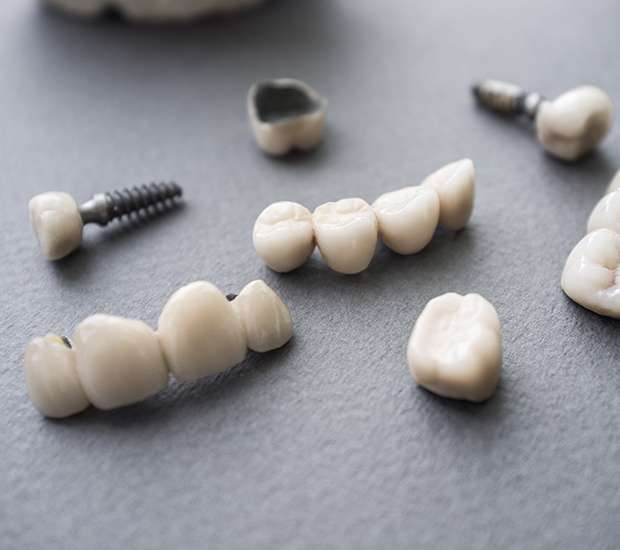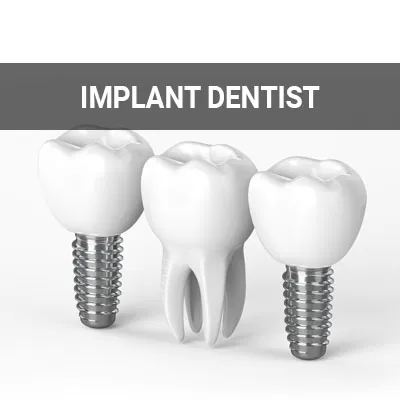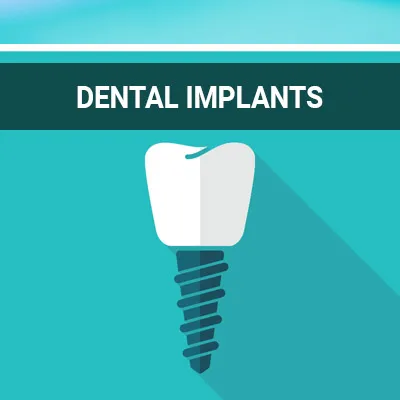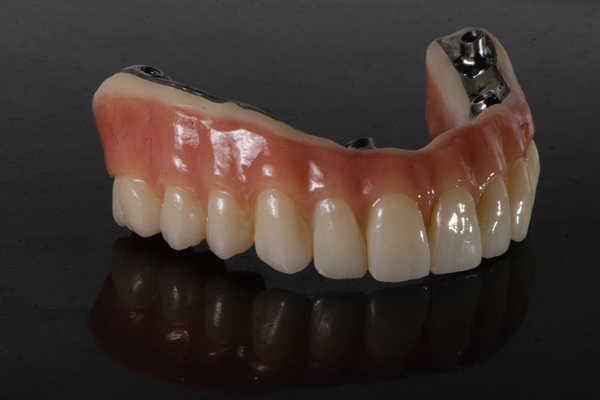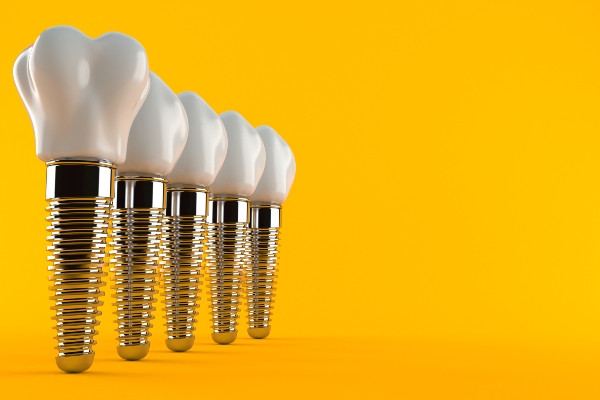The Difference Between Dental Implants and Mini Dental Implants Las Vegas, NV
If you have lost one or more teeth, you can have full dental functions by choosing dental implants. With implant restoration, the dentist will offer you regular implants or mini dental implants. Mini dental implants are smaller than conventional implants and do not require as much healthy bone tissue for placement. It is a good alternative for patients who do not want or cannot undergo a bone graft procedure.
Mini dental implants are available at Hybrid Dental in Las Vegas and the surrounding area. They are a reliable option for patients who may be hesitant about the invasive process of regular implants or do not have enough bone mass in their jaws to support them. Call our office at (702) 658-8008 to schedule an appointment with Hybrid Dental for a consultation.
Understanding Mini Dental Implants
You can achieve a more attractive smile, address oral health concerns, and improve overall mouth function through teeth replacement with mini dental implants. Mini dental implants are a type of dental implant that is used to support dentures, bridges, or a crown. Implants and mini dental implants are available at Hybrid Dental in Las Vegas and the surrounding area. You can learn more about mini dental implants and what steps are involved in the treatment process during your initial consultation.
The greatest difference between mini implants and traditional implants is size, giving them their name. In most cases, traditional dental implants are typically between 4 and 6 mm, whereas mini-implants range from 2 to 3 mm. Placing mini dental implants will also have differences from the traditional procedure. In many cases, the mini dental implant procedure is less invasive.
“In most cases, traditional dental implants are typically between 4 and 6 mm, whereas mini-implants range from 2 to 3 mm.”
Eligibility for Mini Dental Implants
When a tooth is lost, bone degeneration commences. If it takes too long before seeking restoration, the patient may have lost too much bone density to support a regular implant. Jawbone atrophy may also be a result of periodontitis (gum disease), teeth misalignment, or damage from a broken or knocked-out tooth. In this case, the dentist may recommend mini dental implants.
Additional cases where the dentist may suggest mini implants include:
- For front teeth restorations
- Premolar replacements
- Teeth positioned in a narrow gap
- For small teeth
- Where a person suffers from a chronic illness, has undergone radiation therapy or smokes heavily.
The only qualified professional that can determine which type of implant is right for you is an experienced implant dentist.
“If it takes too long before seeking restoration, the patient may have lost too much bone density to support a regular implant.”
Benefits of Mini Dental Implants
Understanding the benefits of each treatment option helps patients make an informed decision. The benefits of mini dental implants include the following:
- Less invasive procedure. For traditional dental implants, the procedure is much more invasive. In contrast, mini implants are easier for an oral surgeon to place and require less intensive treatment.
- No need for bone grafting. Mini dental implants are sometimes an option in instances where there is not enough bone density for traditional implants.
- Fewer complications. The risks of oral infection, implant failure, or longer recovery times are often less significant with mini dental implants.
- Comfortable and convenient. Mini implants look, feel, and function similar to a natural tooth.
“Mini dental implants are sometimes an option in instances where there is not enough bone density for traditional implants.”
Check out what others are saying about our dental services on Yelp: The Difference Between Dental Implants and Mini Dental Implants in Las Vegas, NV
Drawbacks of Mini Dental Implants
Since mini implants are about half the size of regular implants, two MDIs are sometimes required to provide support comparable to one standard implant. This may induce slightly more stress on the jawbone and may extend healing time due to the different weight distribution.
Mini implants may not be suitable for patients who deal with teeth grinding or clenching. Known as bruxism, this issue typically places undue stress on the teeth and with time, may weaken mini implants. To tackle this, the dentist may recommend wearing a nightguard to protect the implant restoration.
The rubber O-rings on the head of the mini implants will require replacement when they loosen or wear out. The frequency of replacement typically depends on how often the patient removes and replaces their dentures.
“The rubber O-rings on the head of the mini implants will require replacement when they loosen or wear out.”
Questions Answered on This Page
Q. When should I consider mini dental implants?
Q. What are the benefits of mini dental implants?
Q. How do I choose between traditional and mini dental implants?
Q. What are eligibility requirements for mini dental implants?
Q. What are the drawbacks of mini dental implants?
People Also Ask
Q. Who is a good candidate for dental implants?
Q. What happens after the procedure?
Q. How do dental implants compare to dentures?
Q. How do dentists determine whether a patient is a candidate for dental implants?
Q. What can patients do to reduce their anxiety about receiving a dental implant?
Choosing Between Implants and Mini Dental Implants
Implants are often best for replacing a single tooth, where mini dental implants are perhaps preferable when looking to support dentures. However, every patient is unique and should evaluate the pros and cons of each option, along with discussing the steps involved in the process with a dentist before making a final decision.
A dental professional can place mini dental implants in the jaw, similar to that of a traditional dental implant. Mini dental implants are the only dental restoration option that preserves natural bone. With that said, traditional implants typically require more bone density than mini implants to ensure a secure hold long-term.
How to Choose the Most Effective Option for You
While traditional implant placement is not as invasive, there are similarities. Both options require accessing the jaw and placing the implant into the bone, but mini dental implants do not require as much support. However, mini implants may not provide as secure a hold. Although the placement of the artificial tooth happens sooner, and the recovery time is generally much quicker with mini dental implants.
Your dentist may recommend one option over the other depending on the amount of bone density you currently have. Mini dental implants are possibly an option at times when traditional implants are not. If both are viable long-term solutions, then the patient's preference will likely be the deciding factor.
“Mini dental implants are the only dental restoration option that preserves natural bone.”
Frequently Asked Questions About Implants and Mini Implants
Q. Are there differences between implants and mini dental implants in terms of durability?
A. Dental implants are created from titanium, a biocompatible metal that fuses with the jawbone. Both options are highly durable, but their lifespan typically depends on the level of care provided. By brushing, flossing, and visiting the dentist regularly, you can keep your oral cavity and implants in excellent condition for a long time.
Q. Will mini dental implants be as strong as my natural teeth?
A. In most cases, mini implants have the same strength – if not more – than natural teeth. Mini implants provide full dental functionality and patients will be able to eat all their favorite meals. However, you need to be careful since implant restorations are just as vulnerable to damages as natural teeth.
Q. Is the placement procedure painful?
A. Many patients often register their surprise when they realize the convenience of the implant procedure. If you suffer from dental anxiety, you should talk to the dentist. They will discuss options to keep you as comfortable as possible throughout the procedure.
Q. How long does recovery take?
A. With mini dental implants, you can return to your routine almost immediately. The procedure is minimally invasive, which allows for fairly fast healing. In the first 24 hours after the procedure, you may need to take only soft foods and follow your dentist's instructions for a full recovery.
Dental Implant Terminology
Call Us Today
If you are interested in restoring your smile, call us at 702-658-8008 for more information about implants and mini dental implants. We are here to help you make the right decision about replacing missing or severely damaged teeth. Our friendly team is willing and able to answer any questions you have about the process.
Helpful Related Links
- American Dental Association (ADA). Glossary of Dental Clinical Terms. 2024
- American Academy of Cosmetic Dentistry® (AACD). Home Page. 2024
- WebMD. WebMD’s Oral Care Guide. 2024
About our business and website security
- Hybrid Dental was established in 2012.
- We accept the following payment methods: American Express, Cash, Check, Discover, MasterCard, and Visa
- We serve patients from the following counties: Clark County and Nye County
- We serve patients from the following cities: Las Vegas, Summerlin, North Las Vegas, Spring Valley, Paradise, Henderson, Centennial Hills, Mt Charleston, Enterprise and Pahrump
- National Provider Identifier Database (1306143847). View NPI Registry Information
- Healthgrades. View Background Information and Reviews
- Norton Safe Web. View Details
- Trend Micro Site Safety Center. View Details
Back to top of The Difference Between Dental Implants and Mini Dental Implants
QR code for The Difference Between Dental Implants and Mini Dental Implants
